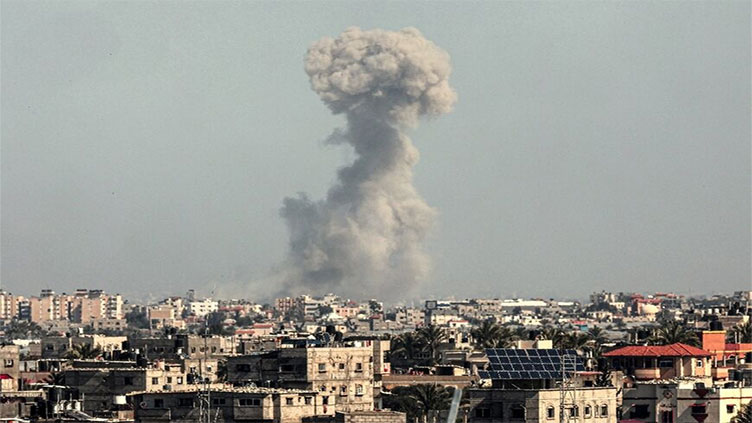Hunger grips war-torn Gaza as truce talks resume in Cairo

World
Heavy fighting rocked besieged Gaza on Wednesday as aid agencies warned of looming famine.
GAZA STRIP (Reuters) - Heavy fighting rocked besieged Gaza on Wednesday (Feb 21) as aid agencies warned of looming famine and new talks were held in Cairo towards an Israel-Hamas ceasefire and hostage release deal.
The White House sent Middle East envoy Brett McGurk for renewed talks involving mediators and Hamas, a day after a United Nations Security Council resolution calling for a ceasefire was blocked by the US.
Global concern has spiralled over the high civilian death toll and dire humanitarian crisis in the war sparked by Hamas's unprecedented Oct 7 attack against Israel.
Combat and chaos again stalled sporadic aid deliveries for desperate civilians in Gaza, where the UN has warned the population of 2.4 million is on the brink of famine and could face an "explosion" of child deaths.
The UN World Food Programme said it was forced to halt aid deliveries in north Gaza because of "complete chaos and violence" after a truck convoy encountered gunfire and was ransacked by looters.
Hamas called the move a "death sentence".
More Israeli strikes continued to pound Gaza, with 118 people killed in the last 24 hours, according to the health ministry in the Hamas-run territory, which put the overall death toll at 29,313.
Air strikes continued into Wednesday evening, according to an AFP correspondent.
Abdel Rahman Mohamed Jumaa said he lost his family in strikes on Gaza's far-southern Rafah.
"I found my wife lying in the street," he told AFP. "Then I saw a man carrying a girl and I ran towards him and ... picked her up, realising she was really my daughter."
He was holding a small shrouded corpse in his arms.
RAFAH CONCERNS
Concern has centred on the packed city of Rafah, where 1.4 million people now live in crowded shelters and makeshift tents, fearing attack by nearby Israeli ground troops.
Aid groups warn a ground offensive could turn Rafah into a "graveyard", and Washington has said displaced civilians must first be moved out of harm's way.
Palestinians in Rafah were digging new graves in the sand on Wednesday, with shrouded bodies carried on donkey-led carts.
Israel said it had allowed in 98 humanitarian trucks on Tuesday, as an umbrella group of 80 international NGOs warned that much-needed aid was facing long delays and entry denials by Israeli inspections.
Israeli Prime Minister Benjamin Netanyahu has insisted the army will keep fighting until it has destroyed Hamas and freed the remaining 130 hostages, around 30 of whom are believed to be dead.
The war started when Hamas launched its attack on Oct 7, which resulted in the deaths of about 1,160 people in Israel, mostly civilians, according to an AFP tally of official Israeli figures.
Hamas also took about 250 hostages, many of whom were released during a week-long truce in late November.
Israel has heavily bombed Gaza since and launched a ground invasion that has seen troops and tanks push through from the north towards the south, leaving vast swathes entirely destroyed and many people struggling to find basic supplies.
One sewing workshop in Rafah said it was producing makeshift diapers with medical cotton, gauze and lab coat fabric, each made by hand - but warned their capacity is far from enough to meet demand.
"I don't have money to provide food, so how can I provide diapers for her?" said mother Hanan al-Bahtiti, adding that her baby daughter gets painful skin rashes.
"She screams in pain and I cry when I see her like this," she told AFP.
NEW TRUCE TALKS
The World Health Organization chief called the situation in Gaza "inhumane", saying the territory had become "a death zone".
McGurk, the White House coordinator for the Middle East and North Africa, was in Egypt as part of efforts to advance a hostage deal, before heading to Israel Thursday.
Hamas chief Ismail Haniyeh was already in Cairo for talks, the militant group said.
Qatar and Egypt have proposed a plan to free hostages in return for a pause in fighting and the release of Palestinian prisoners, but Israel and Hamas have so far failed to agree on a deal.
Washington argued that approving the UN resolution on Tuesday would have imperilled the ongoing efforts to free hostages after it vetoed an Algeria-drafted resolution demanding an immediate ceasefire and the release of all hostages.
Hamas said the US veto amounted to "a green light for ... more massacres".
As the bloodiest-ever Gaza war has dragged into a fifth month, Israel has faced a growing international chorus of criticism.
Colombian President Gustavo Petro accused Israel of "genocide" after Brazilian President Luiz Inacio Lula da Silva had compared the Gaza campaign to the Holocaust.
The war has set off clashes elsewhere in the Middle East, drawing in Iran-backed armed groups in Lebanon, Syria, Iraq and Yemen.
In Syria, state television said an Israeli missile strike killed at least two people in Damascus, a claim Israel declined to comment on.
And Lebanon's Hezbollah movement fired rockets into Israel on Wednesday after an earlier Israeli air strike on south Lebanon killed a woman and a girl.
Violence has also flared in the occupied West Bank where the Israeli army said its troops killed three Palestinian militants during an overnight raid.
Netanyahu has also been facing increasing domestic pressure to quickly secure the return of the hostages.
A poll published Wednesday found a majority of Israelis do not believe that "absolute victory" is a likely outcome from the war, despite Netanyahu's insistence Israel will continue until that is achieved.


